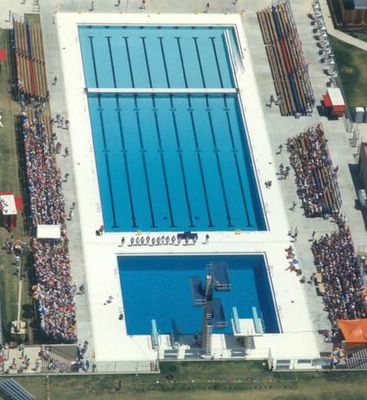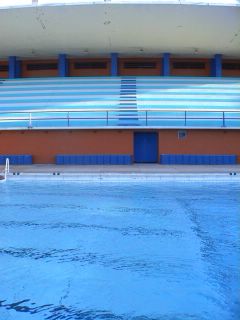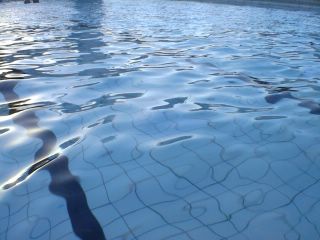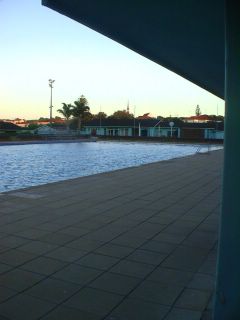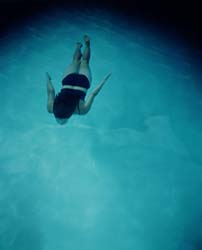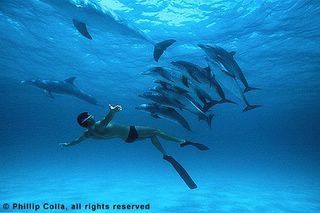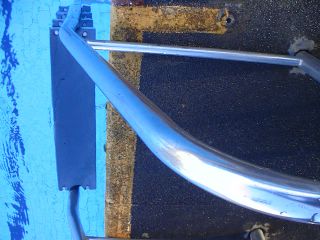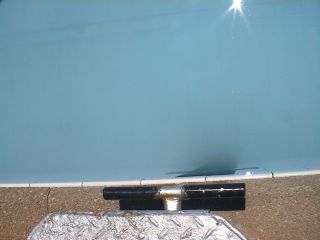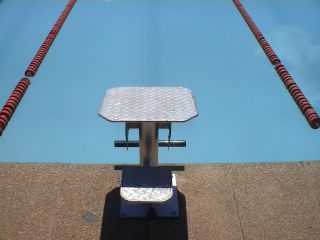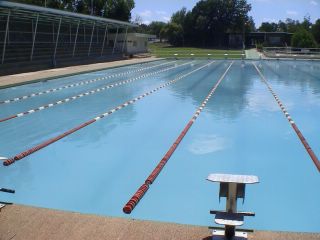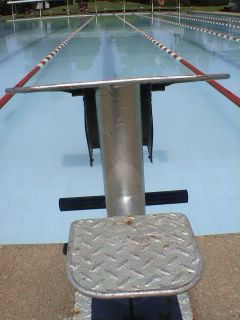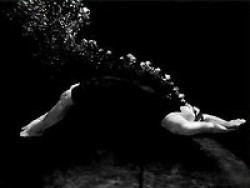A swimming pool is transformed when it is time to race. A race at a swimming pool is called a gala. A gala has a different meaning to a race. It conjures up feelings of celebrity, of a sumptuous feast, and festivity, and races at swimming pools are often just these. There is diving and splashing, gunshots, the flash of lights and flags off the water, the coaches and parents and mobs shouting and pressing and pointing, the timekeepers in white advancing on the advancing swimmers, and the understated sensuality of strangers side by side, removing their clothes for the water.
I swam so many races most are a blur. But three do stand out. I will describe the three races here, but first it is important to show the subtlety and significance of racing in a simming pool as opposed to a track or someplace else.
One was a backstroke race, another was a freestyle relay, a third was a 1500m race when I was a student at the university. Others come into my mind now that my mind returns to long ago shapes of the pool, with its red, white and blue lane lines streaking from one side of the pool to the other.
I remember the moths dancing around the bright lights, many of them falling drunkenly down in front of the seated spectators, down, down to fall and flap weakly in lane 10, nearest the side. None of us wanted to swim in lane 1 or Lane 10. That was for the moths and grasshoppers.
Young children who swim may seem to be playful before and after the event, but the reality lies deeper. The race itself is a defining moment. Even a child can sense that, and appreciate the seriousness of the situation.
Will the training pay off? Will the pace be right? Will I anticipate the start and the turn correctly? Will my goggles stay on? Will I remember to keep my fingers closed, to stretch, to feel the water, in the panic of the water, the rush of the race?
And when it is over, when I touch the wall, and lift my head from the crystal, and face the lights and the rainbows, what will I see? Where will I be? What time will be mine?
Will I be first or last or somewhere in between?
Racing tells me, most importantly, who I am, in relation to those others around me.
I realise that this is not as elementary as it may sound. Knowing my place means also knowing something far more significant|: my power in relation to those around me. It gives me a powerful portent when I am so young into what will be my place and my part to play in this world. Once I know my place it means either I can be accepting or rejecting of myself, and of the winner. I can be acceding to defeat or fighting for victory in race upon race upon race. A race in the most basic sense shows me who has the most power and mastery over the field, and more directly, how much power I have over myself.
Someone said, A kiss may not be the truth, but what we wish were true.
A kiss is one way to discover my power over myself, and my confidence in others. I mean, of course, kissing someone who I have never kissed before.
There is a subtle race, maybe one of endurance, but also strategy – like in a cycle tour – in the race for a kiss. Too fast, and I risk overplaying my hand. Too slow, and my faint heart will not win the fair lady.
The same can be said for races. A race is, after all, simply a gathering of people, in a confined space, intent on the same goal. Too fast, and energy gets squandered and lost. Too slow…No, it must be just right. This is also the miniature of our greater existence on this planet, as we race to be more industrious, productive, faster, or smarter than those around us. A race is an important quest, whether you are ten years old, or twenty.
The race in the blue lane of an Olympic pool is but a shimmering of the great and terrible races that generations have swum over the shores and streets and hills of our world.
The most serious of all races is the Arms Race, the race to war, where it seems that the pace for bloodshed must exceed the depth and breadth of our unfolding fears. We race spectacularly into battle, but the withdrawal is slow and limp.
The Red Army’s race, in January and February of 1945, to Berlin, was one of pride and celebration, after the fear and aggravation that preceded their advance. They had resisted the German advance at Stalingrad, they had seen the Germans at the Volga, they had finally defied the myth of German invincibility. Hitler had said that Russia was like a rotting structure that once kicked, would soon fall. Germany made rapid progress and got to within 20 miles of the Kremlin in Moscow. But the winter came, and the snow fell on German soldiers and their machines, waiting outside the city. Soon, their supply lines struggled,, men fell and machines were crushed in ice. Not enough reached men bent on enduring a Russian winter. As supply lines failed, Stalin struck back and the tide turned.
Russian T-34 tanks covered 50 miles a day, as they advanced over Poland towards Germany. Once over the border, the Russians soon reached Berlin, and went from suburb, to street, to house in search of their target. Hitler’s bunker. That was a race, and a fiercely fought one. The Germans frantically resisted, knowing what they had done in their race to conquer other races. Hitler himself could not face his own defeat; he could not face those he had ordered others to destroy.
And the race is where I have dealt with defeat, or found myself first.
Whoever I am, whether I am a Spitz or a Stalin, an Armstrong, a Mandela or a Diana (Princess of Wales), my race has a common cause. A prize. It may be to simply be way, way ahead of someone beside me, or a bunker in a foreign capital, a maillot jeune (yellow jersey), it may be freedom or it may be a fairy tale.
For me it was all of these. When I was 11 years old, I dedicated myself to one race, over the course of a year. The prize lay in a faraway city, and there I would meet Luke Wollenschlaeger – a boy as big and powerful as his name, and younger than me. Winning meant I would get Free State colors, a green and orange tracksuit, and bathing costume. I decided that if I won, I would give myself the freedom to leave swimming, to try something else like rugby or tennis, to have friends over and play again, to retire from training all the time – for a while – having reached the top of my game.
My fairy tale, my dream was to be the number one swimmer in my province in the 50 m Free Style, in 1984. I spent a year pursuing this goal, training rigorously, focussing, avoiding distractions, turning down invitations to birthday parties or even school trips so I could train each day. Giving up soccer, and soda pop and chocolates. This was the biggest race, the biggest thing I had ever set my mind towards.
Yet I also remember a backstroke race at the university pool when I was about 12 years old. They said Derek Grant’s record was on the line. Everyone was aware of it.
In the end Charl Bormann came first, Almero Strauss was second and I was third, but all three of us broke the record that day. Derek was Penny’s son, and I remember that race for many reasons. There were a few rugby celebrities there, giving autographs. There was the calm satisfaction and congratulations from Penny, despite her knowing that we three had taken away her son’s record. The warmth of the gesture, the handshake, and behind the words was a sense of honor and respect that words don’t quite do justice.
At an interprimary gala we also broke a record by 13 seconds, and this went to the newspapers. I got a small silver trophy along with my teammates.
The 1500m is 30 lengths of an Olympic pool. Sometimes it’s hard to keep track. I was out to beat one particular rival. But I faded after about 200m and soon after last track of which length I was on, and then waited to see when the winner was home because then I knew I still had a 100m to go.
I’m sure I was last or second last, and came in perhaps even 3 lengths after the winner, if not more. But I remember that day like it was yesterday. I even remember thinking, hoping, that I might even win it. I swam this race when I was about 20, but what is important to me now is that spirit of adventure, going into the race. Before the race starts, anything is possible, and in that, lies the magic and the mystery. But the race itself is the truth, at that moment.
But none of these races, nor those Winter Championships in Sasolburg, or a 3.9km race in Korea in 2004, represented my Race of Truth. They were footnotes around it. I remember as a young swimmer, being stuck for months on 40 seconds in the 50m freestyle, and 1 minute 20 in the hundred metres. I remember doing a race after a holiday on the Wild Coast, and going about 2 seconds better. It showed me how hard work is important, but sometimes a good rest, a re-examination at the right time, can lead to a breakthrough.
After a few disappointing races, and thousands of hours in the pool, over 2 decades, Ryk Neethling quit swimming. But then he came back to it again, for the love of it. He says he swam for just half an hour a day in the beginning, and enjoyed it so much, he decided to swim more. And then he thought even further, about a gold medal. Not only was his body fresh, but his mind and spirit rejuvenated and clear. And that flows through the body into the water. He came back and he broke maybe a half dozen world records in 2005.
My Race of Truth though was about consistently applying discipline over a long period, working very hard, training when sick, or tired, or unhappy. Pursuing a goal with single-mindedness. It was about being hardcore, and I believe the little boy that I was…the 11 year old…showed a toughness that I have not seen since, not to that degree, even in these times, running marathons and training for the Ironman. I look to that little boy for courage and inspiration.
